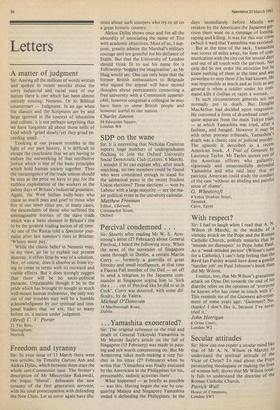Letters
A matter of judgment
Sir: Among all the millions of words written and spoken in recent months about the sorry industrial and racial state of our nation there is one which has been almost entirely missing: Nemesis. Or its Biblical counterpart — Judgment. In an age when the classics and the Scriptures are by and large ignored in the context of education and culture, it is not perhaps surprising that we have forgotten all about those mills of God which 'grind slowly/yet they grind ex- ceeding small...'
Looking at our present troubles in the light of our past history, it is difficult to escape the conclusion that we are having to endure the outworking of that retributive justice which is one of the basic principles which hold human society together. Thus the intransigence of the trade unions should be seen as the price we have to pay for the ruthless exploitation of the workers in the palmy days of Britain's industrial greatness. Again, the West Indian bully-boys who cause so much pain and grief to those who live in our inner cities are, in many cases, the descendants of those who suffered the unimaginable horrors of the slave trade which was a basic element in Britain's rise to be the greatest trading nation of all time. As one of the Rastas told a Spectator jour- nalist after last summer's riots in Brixton: 'Whitey must pay.'
While the classic belief in Nemesis may, in my view, go far to explain our present disarray, it offers little by way of a solution. Nor, of course, does it absolve us from try- ing to come to terms with its outward and visible effects. But it does strongly suggest that there will be no socio-political panacea. Unpalatable though it be to the pride which has brought to nought so much well-meant human endeavour, the only way out of our troubles may well be a humble acknowledgment by our spiritual and tem- poral leaders that we are, like so many before us, a nation under judgment.
(Revd) C. V. Porter
21 The Rise, Sheringham, Norfolk


































 Previous page
Previous page